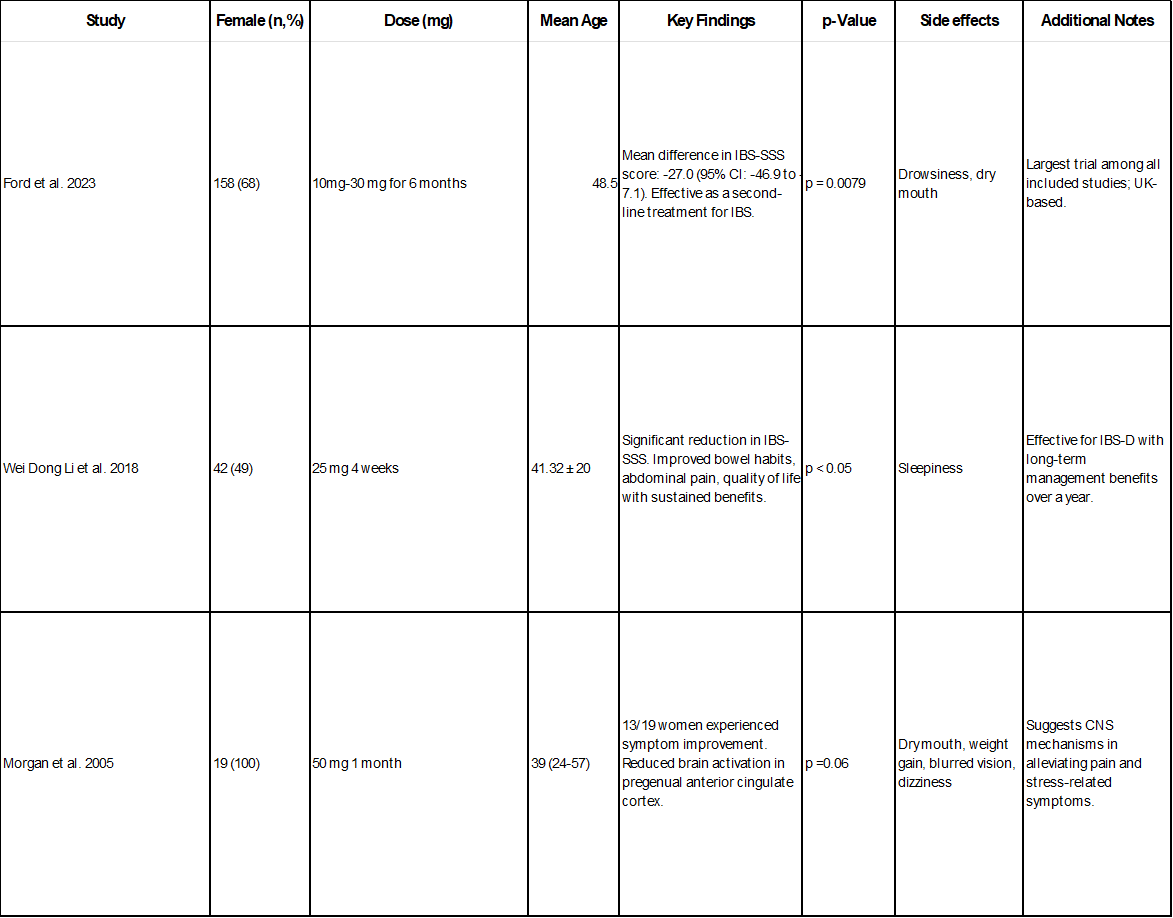Tuesday Poster Session
Category: Functional Bowel Disease
P5076 - Reassessing Tricyclic Antidepressants in IBS: A Review of Amitriptyline Efficacy
Tuesday, October 28, 2025
10:30 AM - 4:00 PM PDT
Location: Exhibit Hall
- MM
Michael J. McCabe, MD (he/him/his)
Tidal Health
Salisbury, MD
Presenting Author(s)
Michael J. McCabe, MD1, Qamar Iqbal, MD2, Zubair Ahmed, MBBS3, Ruqaiya Shahid Raja, 4, Junaid Khan, MD1
1Tidal Health, Salisbury, MD; 2TidalHealth Peninsula Regional, Salisbury, MD; 3Fatima Memorial Hospital, Salisbury, MD; 4Akhtar Saeed Medical College, Salisbury, MD
Introduction: Irritable bowel syndrome (IBS) is a gastrointestinal (GI) disorder characterized by altered bowel habits in association with abdominal discomfort or pain in the absence of detectable structural and biochemical abnormalities. Management of this functional disorder is multidisciplinary including both pharmacological therapies and non-pharmacological adjuncts. A key aspect of management is a patient-centered approach, which emphasizes understanding and empathy towards the patients, and is utilized based on specific subtypes. Medications for IBS include several major classes. The use of amitriptyline, a tricyclic anti-depressant, has been reported in several studies with improved outcomes among IBS patients. We have systematically reviewed published literature on the clinical efficacy of amitriptyline for IBS.
Methods: We performed a literature search on four databases (PubMed, Embase, Scopus, and CINAHL) using MeSH terms “Amitriptyline” AND “Irritable bowel syndrome” from inception to 3rd July 2024, after running the first and second screening of the data results by two independent authors in line with Preferred reporting items for systematic reviews and meta-analysis (PRISMA) guidelines. For our data generation and analysis, we included five Randomized Clinical trials (Figure 1).
Results: Our five included studies investigated the effectiveness of amitriptyline (10mg-75mg) in treating irritable bowel syndrome (IBS), mainly focusing on its impact on pain, stress-related symptoms, and overall quality of life in 236 patients. All five of our included trials were randomized clinical trials comparing amitriptyline to placebo (Table 1). The ATLANTIS trial is the largest among all included studies. The study highlighted its effectiveness as a second-line treatment for IBS when first-line therapies fail in clinical settings (UK-based). The study showed a 6-month post-treatment mean difference in IBS symptom severity score (IBS-SSS) of -27.0 (95% CI: -46.9 to -7.1; p=0.0079) between amitriptyline and placebo group. (Ford et al.). All the clinical trials reported similar side effect profile with symptoms such as drowsiness, dry mouth, blurred vision and weight gain being the major ones.
Discussion: A comprehensive literature review evaluated the clinical efficacy of amitriptyline in managing IBS, with a focus on pain relief, stress-related symptoms, and quality of life. Across five randomized clinical trials using doses of 10–75 mg, statistically significant improvements were consistently reported.

Figure: Summary of Amitriptyline Study Results (Table 1)
Disclosures:
Michael McCabe indicated no relevant financial relationships.
Qamar Iqbal indicated no relevant financial relationships.
Zubair Ahmed indicated no relevant financial relationships.
Ruqaiya Shahid Raja indicated no relevant financial relationships.
Junaid Khan indicated no relevant financial relationships.
Michael J. McCabe, MD1, Qamar Iqbal, MD2, Zubair Ahmed, MBBS3, Ruqaiya Shahid Raja, 4, Junaid Khan, MD1. P5076 - Reassessing Tricyclic Antidepressants in IBS: A Review of Amitriptyline Efficacy, ACG 2025 Annual Scientific Meeting Abstracts. Phoenix, AZ: American College of Gastroenterology.
1Tidal Health, Salisbury, MD; 2TidalHealth Peninsula Regional, Salisbury, MD; 3Fatima Memorial Hospital, Salisbury, MD; 4Akhtar Saeed Medical College, Salisbury, MD
Introduction: Irritable bowel syndrome (IBS) is a gastrointestinal (GI) disorder characterized by altered bowel habits in association with abdominal discomfort or pain in the absence of detectable structural and biochemical abnormalities. Management of this functional disorder is multidisciplinary including both pharmacological therapies and non-pharmacological adjuncts. A key aspect of management is a patient-centered approach, which emphasizes understanding and empathy towards the patients, and is utilized based on specific subtypes. Medications for IBS include several major classes. The use of amitriptyline, a tricyclic anti-depressant, has been reported in several studies with improved outcomes among IBS patients. We have systematically reviewed published literature on the clinical efficacy of amitriptyline for IBS.
Methods: We performed a literature search on four databases (PubMed, Embase, Scopus, and CINAHL) using MeSH terms “Amitriptyline” AND “Irritable bowel syndrome” from inception to 3rd July 2024, after running the first and second screening of the data results by two independent authors in line with Preferred reporting items for systematic reviews and meta-analysis (PRISMA) guidelines. For our data generation and analysis, we included five Randomized Clinical trials (Figure 1).
Results: Our five included studies investigated the effectiveness of amitriptyline (10mg-75mg) in treating irritable bowel syndrome (IBS), mainly focusing on its impact on pain, stress-related symptoms, and overall quality of life in 236 patients. All five of our included trials were randomized clinical trials comparing amitriptyline to placebo (Table 1). The ATLANTIS trial is the largest among all included studies. The study highlighted its effectiveness as a second-line treatment for IBS when first-line therapies fail in clinical settings (UK-based). The study showed a 6-month post-treatment mean difference in IBS symptom severity score (IBS-SSS) of -27.0 (95% CI: -46.9 to -7.1; p=0.0079) between amitriptyline and placebo group. (Ford et al.). All the clinical trials reported similar side effect profile with symptoms such as drowsiness, dry mouth, blurred vision and weight gain being the major ones.
Discussion: A comprehensive literature review evaluated the clinical efficacy of amitriptyline in managing IBS, with a focus on pain relief, stress-related symptoms, and quality of life. Across five randomized clinical trials using doses of 10–75 mg, statistically significant improvements were consistently reported.

Figure: Summary of Amitriptyline Study Results (Table 1)
Disclosures:
Michael McCabe indicated no relevant financial relationships.
Qamar Iqbal indicated no relevant financial relationships.
Zubair Ahmed indicated no relevant financial relationships.
Ruqaiya Shahid Raja indicated no relevant financial relationships.
Junaid Khan indicated no relevant financial relationships.
Michael J. McCabe, MD1, Qamar Iqbal, MD2, Zubair Ahmed, MBBS3, Ruqaiya Shahid Raja, 4, Junaid Khan, MD1. P5076 - Reassessing Tricyclic Antidepressants in IBS: A Review of Amitriptyline Efficacy, ACG 2025 Annual Scientific Meeting Abstracts. Phoenix, AZ: American College of Gastroenterology.
